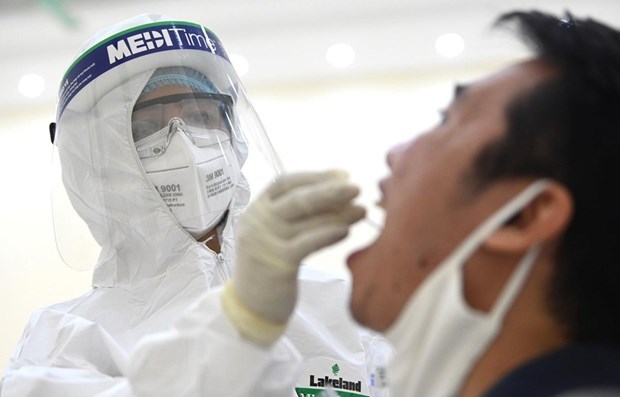 |
|
A health officer takes samples for COVID-19 test using RT-PCR method which is proved to produce more exact reliable results than quick tests.
|
The South Korean man lived in the city from August 16 to October 24 before leaving for Japan. When he arrived in Tokyo he tested positive for coronavirus.
The news led agencies to identify 47 people who had close contact with the Korean man and a further 296 people who the 47 had interacted with.
They were all quarantined and tested and by Wednesday afternoon, all of 343 had returned negative tests.
The Korean man is an expert working for a Japanese company based in Hanoi. He entered Vietnam on July 29 and was quarantined for 14-days before testing negative.
He travelled to work in a few localities in Vietnam and stayed in HCM City from August 16 to October 24.
After leaving HCM City to travel to Tokyo, he tested positive tat Narita Airport with quick COVID-19 test method CLEIA (chemiluminescence enzyme immunoassay) as per Japan’s regulation.
Japan’s authority would then test him with the confirmatory RT-PCR method and soon inform HCM City’s CDC about the testing result.
It is reported that the Korean expert remains in good health condition.
According to the National Steering Committee for COVId-19 Prevention and Control, Vietnam reported no new cases on Thursday morning, marking 57 days without any community infections nationwide.
Hà Nội has gone 72 straight days without infections in the community and HCM City 89 straight days.
In total, 1,062 patients have been given the all-clear. The fatalities remain at 35.
Among the active patients, six have tested negative for the coronavirus SARS-CoV-2 once, three twice and eight three times. There are no patients in critical condition.
As many as 14,216 people who had close contact with COVID-19 patients or came from overseas are now under health monitoring nationwide, including 172 in hospitals, 12,812 in other quarantine sites, and 1,232 at home or accommodation facilities.
The Ministry of Health advised the community to continue wearing masks and wash their hands regularly. — VNS